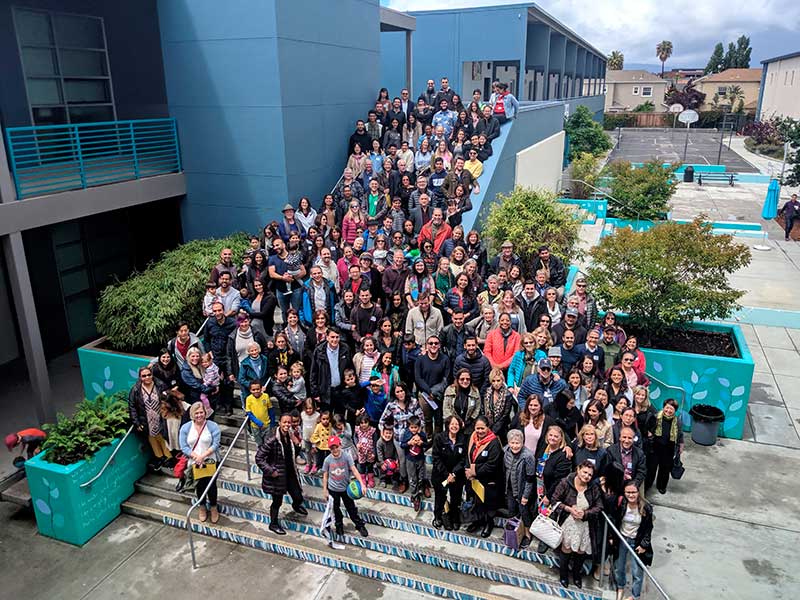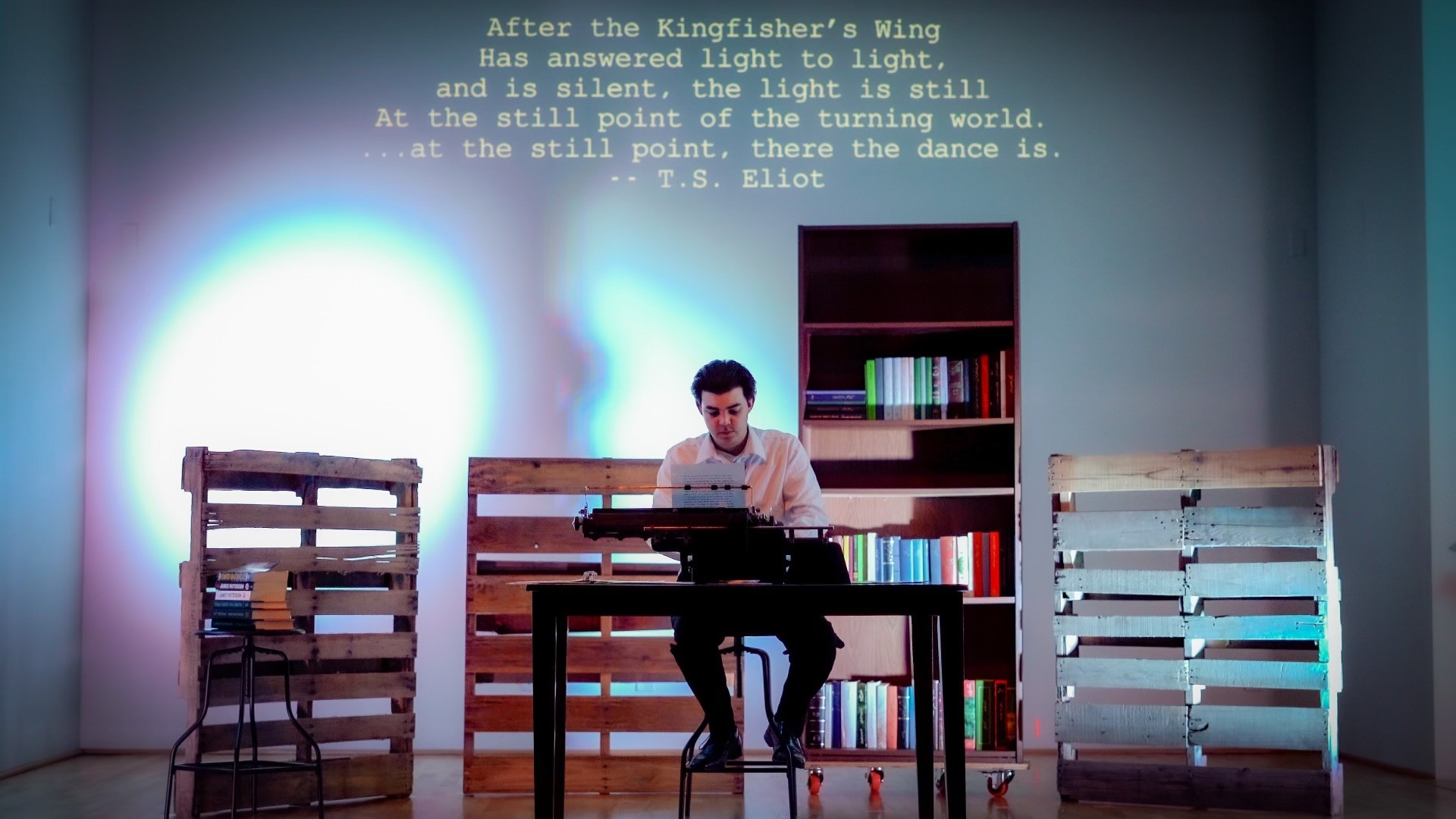
Part-time pioneers see value for both places they live
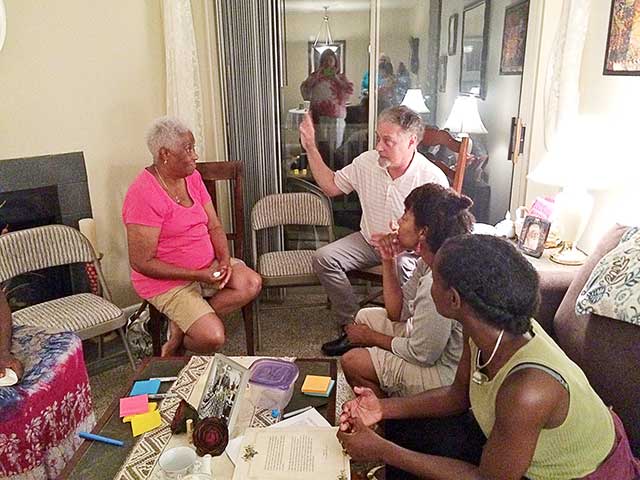
Can one be a percentage pioneer? That’s how Roi and Linden Qualls of Yellow Springs, Ohio, and Rob and Midge Falconer of Henrico County, Virginia, see themselves.
The Quallses are living in Columbus part of each week so they can contribute to the community-building process in a neighborhood of immigrants and then bring what they learn back to their hometown.
Rob Falconer travels to Connecticut several days a month for work and uses an apartment in Middletown to engage in that community’s efforts, with Midge’s assistance. They, too, see their experiences in each locality aiding efforts in the other.
“The receptive ears continually astonish me”
Roi Qualls explains how their Columbus service came about.
“Once upon a time, not so long ago, I attended a gathering where people shared what they have learned,” he recalls, about strengthening a process of learning and service through the Baha’i training institute.
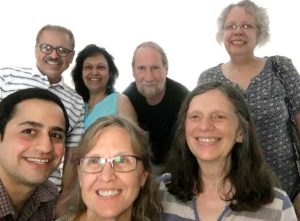
“One of the participants from Columbus shared a comment that grabbed my attention: ‘In the Northland area of Columbus people are so receptive that we could form as many children’s classes as we have teachers for them.’”
As he drove home he reflected: Yellow Springs is part of a cluster of communities that needs to learn about building community intensively in a receptive neighborhood. Since that cluster doesn’t have that kind of experience, “it represented, I thought, an important frontier of learning for us.”
In short, Yellow Springs could advance if the couple were to spend part of their time gaining experience in a Columbus neighborhood.
And though the project was initiated before a national call for pioneers was issued, “it was clear to me that — for the effort to succeed and yield its lessons — we would have to live there,” Roi Qualls reflects. “I never considered any approach that did not have us put stakes down in the neighborhood.”
But only part time. Roi Qualls would continue working in Yellow Springs until 3 p.m. Thursday each week. Then he’d drive the 60 miles to Columbus to serve through Sunday in the Northland neighborhood.
His wife, Linden, would pop over to Columbus for a day each week to teach children’s classes. A commitment to accompany two youths in starting a children’s class in Yellow Springs would keep her from spending more time in Northland.
Even a partial week in Columbus would mean scaling down at home, however. “We consulted with all the parties that would be affected by our reduced presence, even though temporary, in our own cluster,” says Roi Qualls.
“We consulted specifically with our children, who rely on us to an extent for childcare.”
The couple also met with the Yellow Springs Spiritual Assembly and Auxiliary Board member Jason Combs, who works in an advisory capacity with their cluster.
“And, of course, I was in constant collaboration with Louis Maani, the Auxiliary Board member focused on the Columbus cluster. He made it his business to follow up with me during the cogitation and planning phase to make sure progress was advancing,” says Roi Qualls.
As a member of the Regional Baha’i Council of the Midwestern States, Qualls needed to consult as well with that institution, because the Columbus effort would reduce his participation.
Where to stay in Columbus was solved when the Columbus Spiritual Assembly decided to rent an apartment in the neighborhood.
To choose it, “We drove around on a few occasions and visited several families that have been involved in community-building activities over the years,” he recalls. “We settled on an apartment complex that was home to two of the junior youths” in an existing group.
And the experience thus far?
“As have many veteran Baha’is, I have had the privilege to serve the community in numerous capacities,” he notes. “None of that approaches the exhilaration I have experienced in the first weeks of this project.
“The direct interaction, the numerous and authentic conversations, the abundant possibilities, the receptive ears continually astonish me, confirm me, fire my imagination. And I don’t think Linden and I have even scratched the surface yet.”
“Serving in either place [is] easy”
Rob Falconer has been commuting regularly from Virginia to Connecticut since about 2005.
To save money in comparison to hotel charges, in 2012 his company began subsidizing the rent on an apartment.
Both Falconers are well familiar with the Baha’is of the area. Rob was raised in Vernon and Midge grew up in a Baha’i family on Long Island, a short jaunt across the Sound.
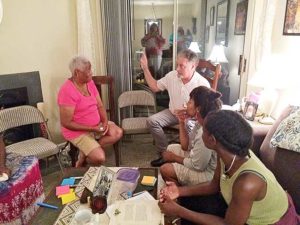
The choice of Middletown, less than 20 minutes from Rob Falconer’s company, was a “conscious one from the Baha’i standpoint,” he says.
Middletown had lost its Local Spiritual Assembly when the number of adult Baha’is dipped below nine. It was hoped “maybe we could recapture some Baha’i spirit and activity” in that diverse city, midway between Hartford and New Haven, that’s also home to prestigious Wesleyan University.
So they reached out to Middletown Baha’i Shelley Rothman, also formerly from Vernon, and set out to find an apartment. Once settled in, they worked with Rothman to establish regular devotional meetings and fireside talks at the apartment.
Local Baha’is support the gatherings, which occur at least once and sometimes four times a month. They serve as speakers, organize devotional materials and contribute “lots of potluck food.”
When they can, Rob and/or Midge Falconer take over the cooking or take their place in the rotation of facilitators and speakers.
“At least two souls have declared as Baha’is from these meetings,” says Rob Falconer, “and several new seekers, including some children and youths, learned of the Faith for the first time.”
Midge Falconer serves the training institute by coordinating study circles in two clusters of communities in Virginia. So it’s natural that study circles have emerged in their Middletown apartment as well.
“The training institute is a powerful unifying process in both Virginia and Connecticut,” the Falconers note. “The common framework for action … makes serving in either place easy.”
The two-way learning extends to sharing “stories of inspirational outcomes in either Connecticut or Virginia with Baha’is in the other location — in Assembly meetings, at Nineteen Day Feasts or devotional meetings,” they say.
“This summer, we’re at it again in Connecticut after some lulls. Send some prayers our way!”


